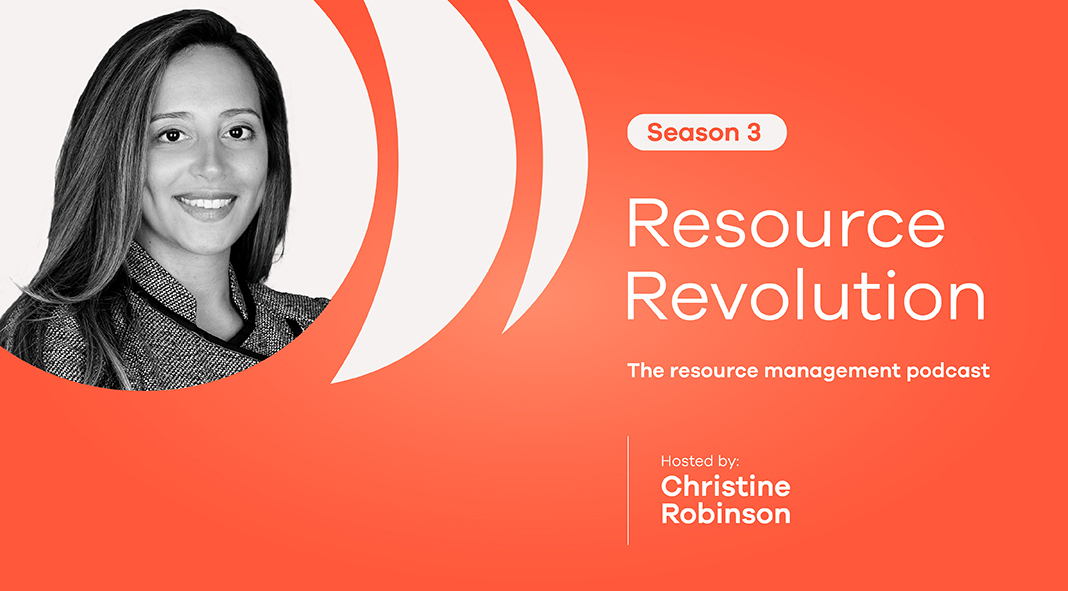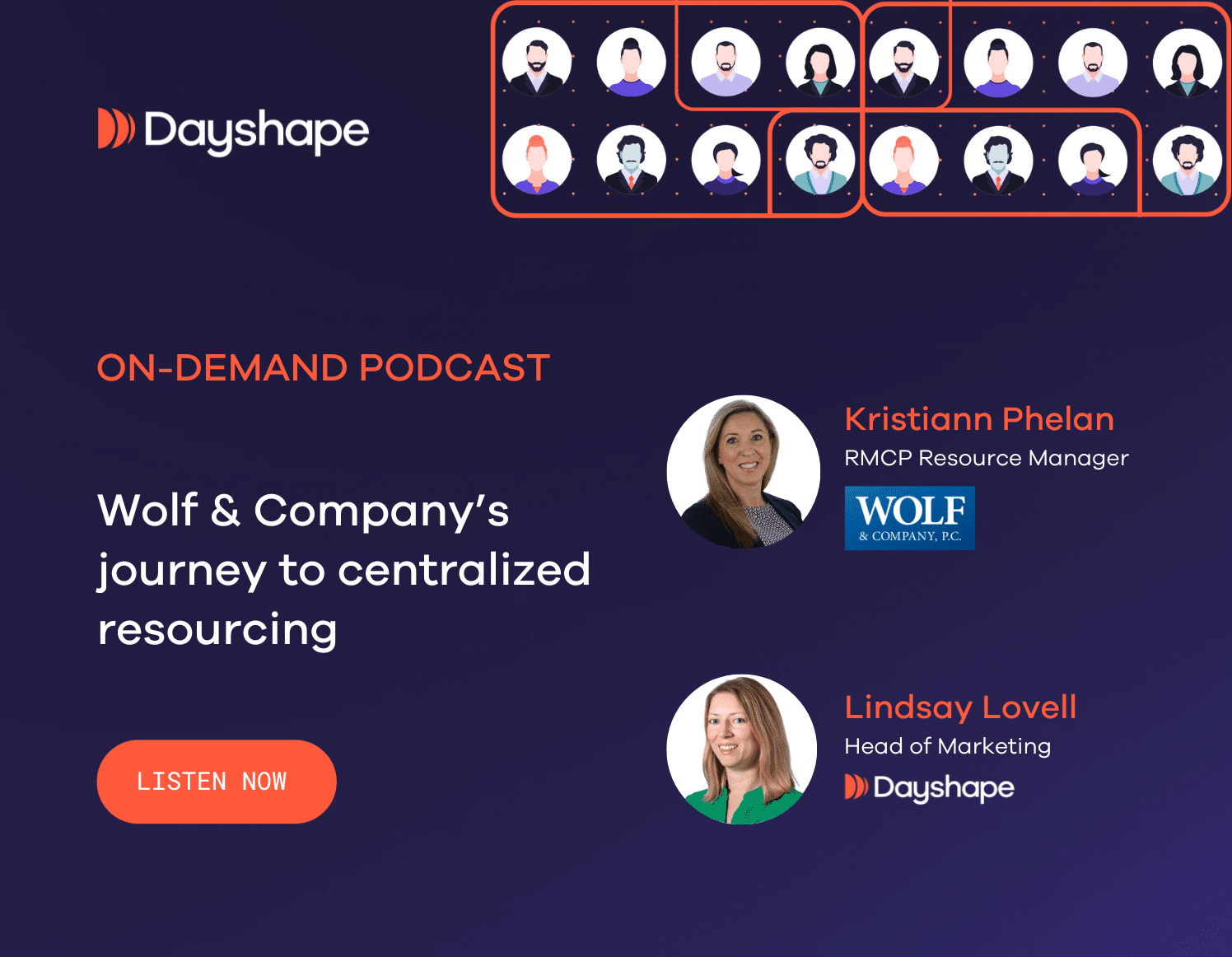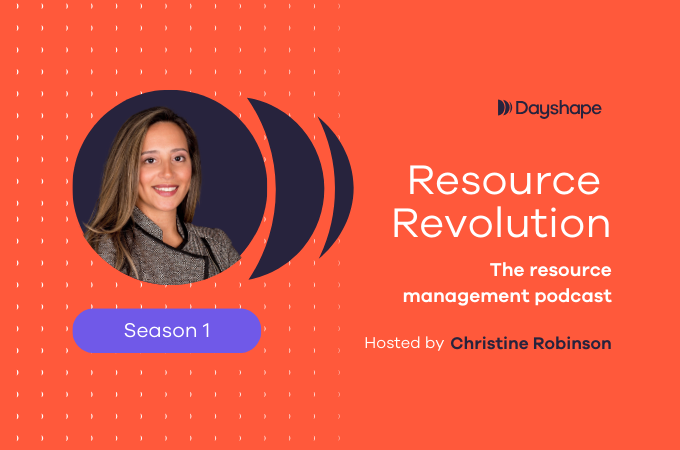Request a Dayshape demo
Get in touch and learn first-hand how Dayshape can help boost profitability, improve client service, and keep your teams happy.
Platform
Strategic resource management
Optimize margins. Grow revenue.
Plan reliably. Act confidently.
Inspire teams. Delight clients.
Enterprise scalability
Use Cases
How Dayshape helps firms
10 ways for resource managers to elevate their impact

Elevate your role, expand your influence, and drive impact across your firm.
Listen nowCustomer Success
Value at every stage
Company
More about Dayshape
Resources
Learn more
Resources
Featured resources
Resource Management Maturity

The complete blueprint to transform your resource management.
Learn moreHosted by Christine Robinson
27 Sept 2024 • 39 min
More about our host and guestsListen to this podcast on

Welcome to our new blog series, featuring essential takeaways from Resource Revolution – The Resource Management Podcast.
In this blog, we recap the standout moments and key insights shared in season one. With a line-up of industry experts, host Christine Robinson, and her guests explore emerging trends, share real-world experiences, and reflect on key strategies for elevating impact and influence as a resource management professional.
Here's our top takeaways, with special thanks to our season one podcast guests.
A standout theme throughout the season was that resource management is a profession on the rise. As businesses expand, the demand for skilled resource management professionals has grown and will continue to do so. The professional services industry has been at the forefront of this shift, recognizing resource management as a distinct discipline and providing clearer career paths for those in the field. Our guests emphasize that with resource management skills in high demand, career opportunities for emerging leaders are more promising than ever.
"Resource managers and leaders have never been more vital than they are today. The opportunity to showcase their significance—and receive due recognition—has never been as prevalent as it is now."
"As a company scales, the resource management roles and departments that will exist tomorrow don't exist today. This presents an opportunity for resource managers to chart their own path and advance their careers."
A key talking point across the season was the value of resource management data and insights. Our guests highlighted the unique insight and perspective of resource managers, given their access to critical data that others may not have. The key takeaway was that data alone is only as valuable as the stories it helps to tell. Crafting compelling narratives around this data is essential for raising awareness and gaining leadership support for investment in resource management.
"Resource management is not just reporting and analysis, the true value comes from extrapolating the story from the data, giving leadership the headlines so they can make well-informed, strategic decisions to solve organizational challenges."
"What’s really important is how we tell a story with the resource management data. Think about the, "So what?" and why leadership should care. Help them visualize how it impacts them as well as the wider business benefits and implications."
A major shift in the resource management profession is the evolving perception of resource management a revenue-generating function, rather than a purely administrative one. Our guests identified this as the next big trend and discussed the importance of rebranding resource management, making the crucial link to revenue, and selling its value internally. To do this effectively, conversations with leadership must be reframed using language that resonates and demonstrates how resource management directly impacts the bottom line.
"The biggest shift is repositioning resource management from an administration function to a revenue generating function. To do this you need to level up your business knowledge, think like a business leader, and talk in dollars and cents. Communicate the revenue at risk and focus on how resource management capability can enable revenue."
"Successfully connecting the resource management process with budgeting and invoicing is essential. The ability to evaluate whether a project was resourced, budgeted, and billed correctly—and then applying that data to future analyses—will be the fundamental driver of success or failure for accountancy firms in the next 5- 10 years."
A theme that our guests returned to time and again was the growing recognition that technology is vital for effective and strategic resource management. A key talking point was the need for resource leaders to build technology into their business case for resource management investment. By demonstrating how this investment will help the company remain competitive, drive efficiencies, and enhance client service, resource leaders can reposition resource management as a strategic asset.
"Effective resource management is not possible without the support of technology. When building your business case and taking it to the C-suite you must emphasize the importance of investing in the right technology to maximize the business value of resource management."
Resource management, by its very nature, serves as a crucial connection point between key business functions, acting as an integrator across finance, business operations, HR, and various lines of business. This unique position gives resource managers a broader view and a strategic perspective that others often lack. In season one, our guests emphasized how resource managers should use this vantage point to move beyond their traditional administrative and scheduling roles and take a strategic seat at the table. By doing so, resource managers can reach their full potential as key contributors to business success.
"There is an opportunity to transform resource management from a siloed function into a broader, strategic solution that plays a fundamental role in determining business success or failure."
"Resource management is much more than a staffing tool; it’s a valuable asset. As I’ve gained a deeper understanding of its potential, our approach at EY has expanded. We’ve now integrated resource management into our strategy sessions, ensuring that staffing decisions align with the organization’s broader strategic objectives."
"Resource managers bring a unique perspective. To elevate your role as a strategic business partner, you must leverage the information you have exposure to, develop a well-informed point of view, and continuously expand your knowledge."
An emerging trend in resource management is the recognition of its impact on enhancing the employee experience. Our guests discussed the importance of forging a strategic alliance between resource management and HR to drive career development opportunities and retention. When these two functions work in close collaboration, they can nurture career paths and enhance the overall employee experience.
"It’s vital to care for and feed your resources, and resource management and HR are perfectly positioned to work together to accomplish that."
"Resource management is not just about completing projects, it’s also about investing in the people who work on them."
"Resource management holds valuable data that can help answer key questions like, "Are there skill gaps, learning opportunities, or performance issues?" It goes beyond simply addressing supply and demand; it's about ensuring employees are gaining the right career experiences."
An important insight shared was the value of building relationships and communication skills in the resource management role. Guests emphasized the need to help the, "internal users of resource management" understand the process and its broader impact. Investing in connections at all levels was highlighted as essential, not only for excelling in the role but also for shaping leadership perspectives and elevating resource management to a more strategic level.
"To excel, resource managers must cultivate strong relationships and establish meaningful connections with both the individuals they are staffing and the stakeholders they are managing resources for."
"Staffing a project goes beyond assigning people to roles; it requires fully integrating into the team, understanding the individuals, their work, and their professional challenges and aspirations. Embrace the process of getting to know people, as you never know where your next opportunity might arise."
"Effective communication is the key factor in shaping leadership perspective."
As a final takeaway, a recurring analogy throughout the season was the idea of resource management as an ever-evolving puzzle. This analogy reflects the disruptive and intangible nature of the work, where constant innovation and adaptability are key. The advice given is to embrace the resource management puzzle, knowing that while the pieces may shift, there will always be a best-case solution to aim for. Our guests echoed the mantra, "there is going to be a solution" - a truth that resonates whether you're a seasoned resource management professional or just starting out.
"The resources we are managing are people so it’s not as simple as putting puzzle pieces together and finding the perfect fit. The puzzle pieces will continue to change shape, be removed or added, or flipped upside down. So you have to be ready for and embrace constant change. "
"The puzzle analogy is perfect for resource management, you can have a plan at the start of the day, but it can very quickly fall apart. There’s one constant and that’s change. You have to accept this as the nature of resource management."
As we recap season one, we reflect on an inspiring season of insights, discussions, and forward-thinking ideas. Through our conversations with industry thought leaders and experts, it's clear that the role of resource management is evolving in significant and strategic ways.
The standout takeaway? Resource managers have the power to shape both their own future and that of their organization by leveraging their unique position, connections, and insights to revolutionize the resource management function. It’s clear that this is only the beginning of a much larger conversation, and we’re excited to explore the next wave of trends and transformation in season two.
Recap on episodes from Season 1.

Christine is a resource management expert, bestselling author, and award-winning speaker, as well as an advocate for women and underserved families. A first-generation Latina college graduate, she has led national teams, launched international ventures, and founded Resource Management In The Wild to empower organizations.
Discover more insights from Resource Revolution.

2 min read

1 min read

2 min read
Discover how AI can transform your resource management and enhance your project delivery.

Get in touch and learn first-hand how Dayshape can help boost profitability, improve client service, and keep your teams happy.